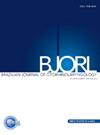视频辅助甲状腺切除术与传统开放手术的比较结果:单中心5年经验分析
IF 1.7
4区 医学
Q2 OTORHINOLARYNGOLOGY
引用次数: 0
摘要
研究目的本研究旨在评估和比较接受视频辅助甲状腺切除术的患者与接受传统开放手术的患者的疗效:在这项回顾性研究中,我们回顾了2017年4月至2022年3月期间在我院接受甲状腺手术的449名患者的临床记录。其中,209 人接受了视频辅助甲状腺切除术,248 人接受了传统开放手术。在排除了接受全甲状腺切除术、中央结节切除术或侧结节切除术的患者后,我们重点分析了136名接受视频辅助甲状腺叶切除术的患者和92名接受传统开放手术的患者。我们比较了这两组患者的手术效果和不良反应等结果:结果:视频辅助肺叶切除术组和传统开放手术组的最大肿瘤直径存在显著差异。结果:视频辅助颈叶切除术组与传统开放手术组在肿瘤最大直径方面存在明显差异,但在手术时间、出血量或不良反应方面无明显差异:结论:视频辅助颈部手术(VANS)具有很好的美容效果,在不良反应方面与传统开放手术相当:证据等级:IV。本文章由计算机程序翻译,如有差异,请以英文原文为准。
Comparative outcomes of video-assisted thyroidectomy and traditional open surgery: a 5-year analysis of a single center experience
Objective
This study aimed to evaluate and compare the outcomes of patients undergoing video-assisted thyroidectomy versus those undergoing traditional open surgery.
Methods
In this retrospective study, we reviewed the clinical records of 449 patients who underwent thyroid surgery at our institution between April 2017 and March 2022. Of these, 209 underwent video-assisted thyroidectomy, while 248 underwent traditional open surgery. After excluding those who received total thyroidectomy, central node dissection, or lateral node dissection, we focused our analysis on 136 patients with video-assisted lobectomy and 92 patients with traditional open surgery. We compared patient outcomes, including surgical results and adverse events, between these groups.
Results
Significant differences were observed in the maximum tumor diameter between the video-assisted lobectomy and traditional open surgery groups. However, no significant differences were noted in surgical time, bleeding, or adverse events.
Conclusion
Video-Assisted Neck Surgery (VANS) offers great cosmetic benefits and is comparable to traditional open surgery in terms of adverse events.
Level of evidence
IV.
求助全文
通过发布文献求助,成功后即可免费获取论文全文。
去求助
来源期刊

Brazilian Journal of Otorhinolaryngology
OTORHINOLARYNGOLOGY-
CiteScore
3.00
自引率
0.00%
发文量
205
审稿时长
4-8 weeks
期刊介绍:
Brazilian Journal of Otorhinolaryngology publishes original contributions in otolaryngology and the associated areas (cranio-maxillo-facial surgery and phoniatrics). The aim of this journal is the national and international divulgation of the scientific production interesting to the otolaryngology, as well as the discussion, in editorials, of subjects of scientific, academic and professional relevance.
The Brazilian Journal of Otorhinolaryngology is born from the Revista Brasileira de Otorrinolaringologia, of which it is the English version, created and indexed by MEDLINE in 2005. It is the official scientific publication of the Brazilian Association of Otolaryngology and Cervicofacial Surgery. Its abbreviated title is Braz J Otorhinolaryngol., which should be used in bibliographies, footnotes and bibliographical references and strips.
 求助内容:
求助内容: 应助结果提醒方式:
应助结果提醒方式:


